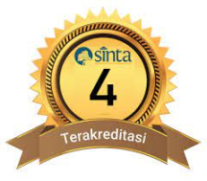THE EFFECT OF STUDENT FACILITATOR AND EXPLAINING (SFAE) COOPERATIVE LEARNING MODEL ON PHYSICS STUDENT’S ACHIEVEMENT
Abstract
Full Text:
PDFReferences
Suyono dan Hariyanto, “Belajar dan Pembelajaran”, Bandung: PT Remaja Rosdakarya Offset, 2011.
Hargrove, R. A, “Assessing The Long-Term Impact Of A Metacognitive Approach To Creative Skill Development”, Int J Technol Des Educ, vol. 23, no. 3, pp. 489–517, 2013.
Trilling, B dan Fadel, C, “21st Century Skills : Learning For Life In Our Times”, San Francisco: John Wiley & Sons, 2009.
Chang, Y, Li, B, Chen, H & Chiu, F, “Investigating The Synergy Of Critical Thinking And Creative Thinking In The Course Of Integrated Activity In Taiwan”, Educational Psychology, vol. 35, no. 3, pp. 1–20, 2015.
Depdiknas, “Permendiknas No.22 Tahun 2006 Tentang Standarisasi Sekolah Dasar Dan Menengah”, Jakarta: Depdiknas, 2006.
Etkina, E, and Heuvelen, A. V, “Investigative Science Learning Environment-a Science Process Approach To Learning Physics”, Research-Based Reform of University Physics, pp. 1–48, 2007.
Trianto, “Model-model Pembelajaran Inovatif Berorientasi Konstruktivistik”, Jakarta: Prestasi Pustaka, 2007.
Lord, T. R, “101 reasons for using cooperative learning in biology teaching”, The T&G Publisher, 2001.
Armi, A, “pengaruh penerapan model pembelajaran kooperatif student facilitator and explaining pada pembelajaran kimia di kelas X SMA”, skripsi, hal.46, Universitas Negeri Padang, Padang, April, 2012.
Miguel, Á.F.J, Esther, M.R dan Ligia, I.E.V, “The Tutor's Roles and Functions in Online Education Qualitative Study Within the Context of Worker Training”, Procedia - Social and Behavioral Sciences, vol. 237, pp. 196- 202, 2017.
Alan, R. N, Reyes, J. R, & Yobani, M. R, “Evaluation module based on Bayesian networks to Intelligent Tutoring Systems”, International Journal of Information Management, vol. 37, no. 1, pp. 1488-1498, 2017.
Sugiyono, “Metode Penelitian Pendidikan Pendekatan Kuantitatif, Kualitatif, dan R&D”, Bandung: Alfabeta, 2012.
Divan, A and Mason, S, “A programme-wide training framework to facilitate scientific communication skills development amongst biological sciences Masters students”, J. Furth. High. Educ, vol. 40, pp. 543–67, 2016.
Nopearti, M, Yelniati, Y, Azmi, J and Abdullah, A, “The Implementation of Cooperative Type Student Facilitator and Explaining (SFAE) Learning Model Use The Concept Map Media to Increase Students Achievement in Reduction and Oxidation Reaction Topic at X MIA SMAN 2 PEKANBARU”, Proceeding of the 1st Annual International Seminar on Transformative Education and Educational Leadership (AISTEEL), pp. 315–8, 2016.
Bao, L, “Theoretical comparisons of average normalised gain calculations”, American Journal Of Physics, vol. 74, no. 10, 2006.
DOI: http://dx.doi.org/10.24036/14179171074








